Emergency HVAC Helston
Best Emergency HVAC Service in Helston
Receive up to 3 Emergency HVAC quotes for your project today! Compare profiles, reviews, accreditations, portfolio, etc... and choose the best service.

Help For Heat
48 reviews9 Limes Ln, Liskeard, PL14 4HR, GBHelp For Heat Emergency Plumber Boiler Repair Liskeard is a family run plumbing business, providing Liskeard area with a friendly professional service for all your plumbing and boiler repair requirements. Our 24 hour emergency plumber Liskeard. With locally based engineers covering these areas, Help For Heat Emergency Plumber Boiler Repair Liskeard specialize in all types of Plumbing services including Emergency Plumbing call outs, Boiler Repair, Boiler installation, Boiler servicing and full heating installations. Help For Heat Emergency Plumber Boiler Repair Liskeard pride ourselves as being one of the area’s premier 24 hour emergency Plumbing companies. When a problem occurs that requires an immediate response we offer complete solutions including Boiler repairs and waterleak repairs throughout Liskeard 24 hours a day, 365 days a year. Highly skilled local Plumbers are on standby with fully equipped vans containing all the necessary equipment to carry out any Plumbing service. With our local Liskeard engineers you know you’re in safe hands. We have had many recommendations through word of mouth. This is due to our policy of putting customer satisfaction as well as safety, above all else. Please contact one of are friendly office staff now to book a appointment.
- Services
- Why Us?
- Accreditations
- Gallery
Get Quote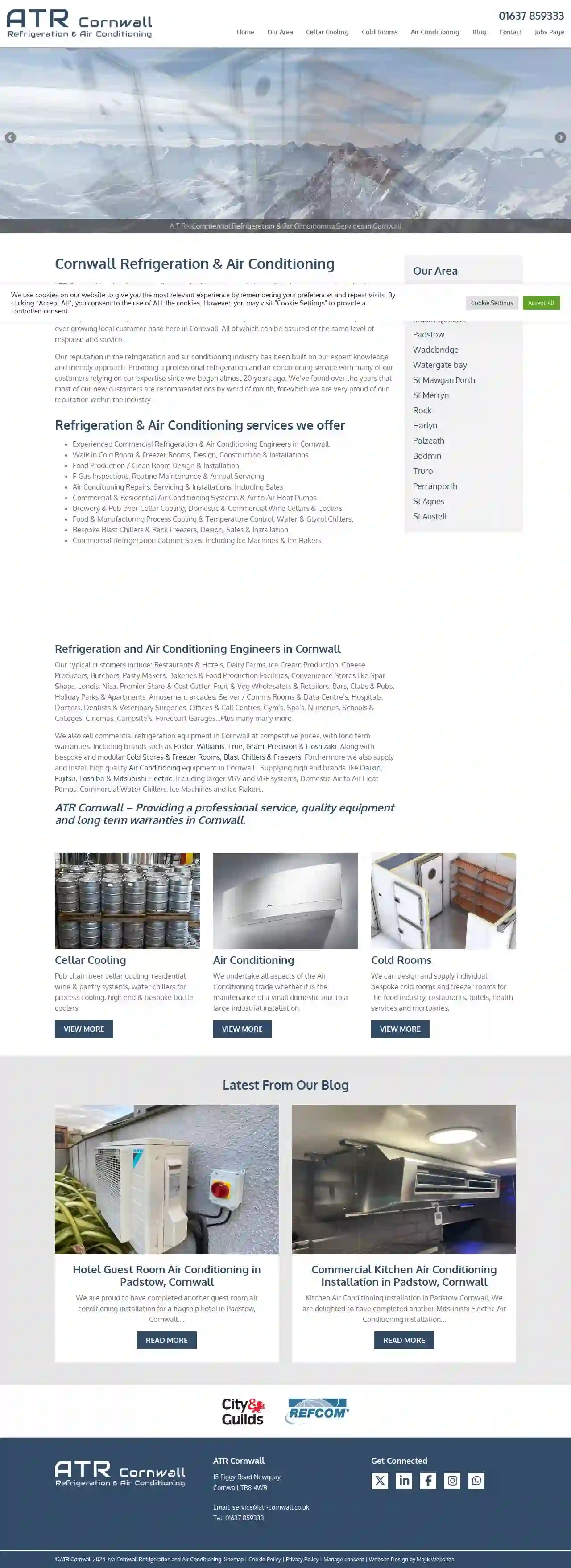
A.T.Refrigeration Ltd
51 reviews15 Figgy Road, Newquay, TR8 4WB, GBA.T.R - Commercial Refrigeration & Air Conditioning Services in Cornwall Kingspan Modular & Bespoke Cold Room Installers in Cornwall Blast Chiller & Freezer Room Installers in Cornwall Residential & Commercial Air Conditioning Installers in Cornwall Cornwall Refrigeration & Air Conditioning ATR Cornwall is a family run, small team of refrigeration and air conditioning engineers based in Newquay, Cornwall. We have been providing customers with modern refrigeration and air conditioning solutions since 2005. Due to our continued commitment to training and development we hope to provide the best service possible throughout Cornwall. We undertake a range of national contracts which compliment our ever growing local customer base here in Cornwall. All of which can be assured of the same level of response and service. Our reputation in the refrigeration and air conditioning industry has been built on our expert knowledge and friendly approach. Providing a professional refrigeration and air conditioning service with many of our customers relying on our expertise since we began almost 20 years ago. We’ve found over the years that most of our new customers are recommendations by word of mouth, for-which we are very proud of our reputation within the industry. Refrigeration & Air Conditioning services we offer Experienced Commercial Refrigeration & Air Conditioning Engineers in Cornwall. Walk in Cold Room & Freezer Rooms, Design, Construction & Installations. Food Production / Clean Room Design & Installation. F-Gas Inspections, Routine Maintenance & Annual Servicing. Air Conditioning Repairs, Servicing & Installations, Including Sales. Commercial & Residential Air Conditioning Systems & Air to Air Heat Pumps. Brewery & Pub Beer Cellar Cooling, Domestic & Commercial Wine Cellars & Coolers. Food & Manufacturing Process Cooling & Temperature Control, Water & Glycol Chillers. Bespoke Blast Chillers & Rack Freezers, Design, Sales & Installation. Commercial Refrigeration Cabinet Sales, Including Ice Machines & Ice Flakers. Refrigeration and Air Conditioning Engineers in Cornwall Our typical customers include: Restaurants & Hotels, Dairy Farms, Ice Cream Production, Cheese Producers, Butchers, Pasty Makers, Bakeries & Food Production Facilities, Convenience Stores like Spar Shops, Londis, Nisa, Premier Store & Cost Cutter. Fruit & Veg Wholesalers & Retailers. Bars, Clubs & Pubs. Holiday Parks & Apartments, Amusement arcades, Server / Comms Rooms & Data Centre’s. Hospitals, Doctors, Dentists & Veterinary Surgeries. Offices & Call Centres, Gym’s, Spa’s, Nurseries, Schools & Colleges, Cinemas, Campsite’s, Forecourt Garages…Plus many many more. We also sell commercial refrigeration equipment in Cornwall at competitive prices, with long term warranties. Including brands such as Foster, Williams, True, Gram, Precision & Hoshizaki. Along with bespoke and modular Cold Stores & Freezer Rooms, Blast Chillers & Freezers. Furthermore we also supply and Install high quality Air Conditioning equipment in Cornwall. Supplying high end brands like Daikin, Fujitsu, Toshiba & Mitsubishi Electric. Including larger VRV and VRF systems, Domestic Air to Air Heat Pumps, Commercial Water Chillers, Ice Machines and Ice Flakers. ATR Cornwall – Providing a professional service, quality equipment and long term warranties in Cornwall.
- Services
- Why Us?
- Gallery
Get Quote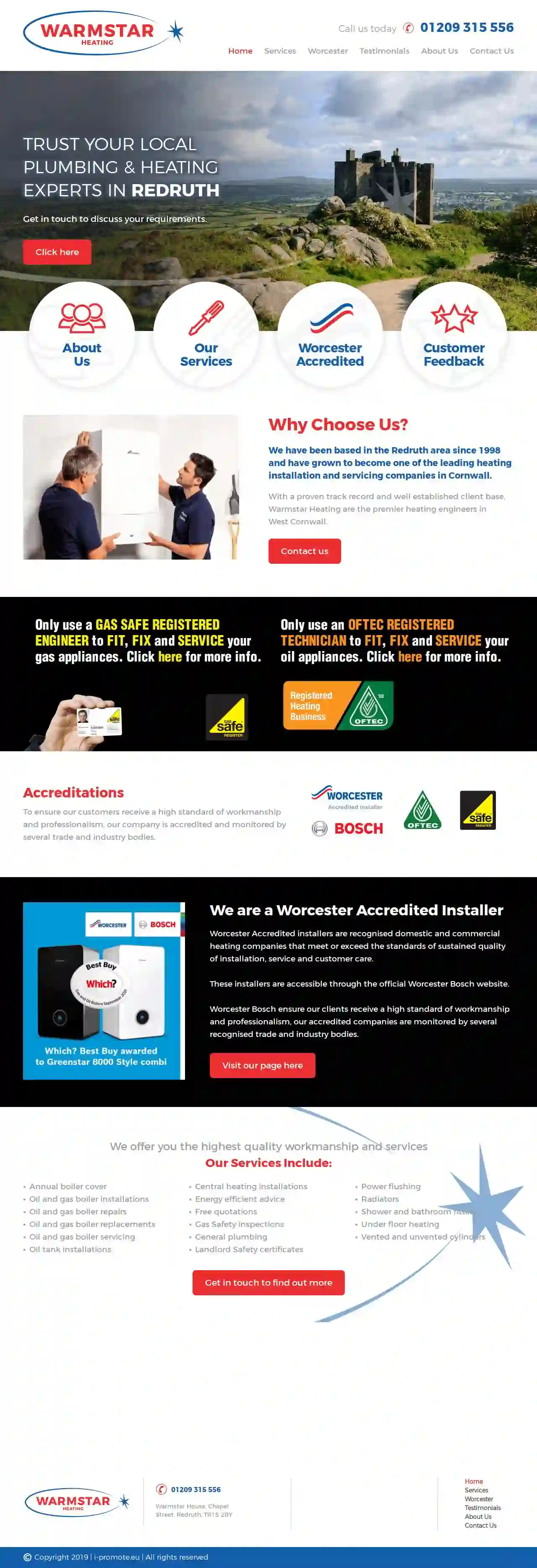
Warmstar Heating Ltd
4.723 reviewsWarmstar House Chapel Street Redruth, Redruth, TR15 2BY, GBWarmstar Heating was established in 1998 from our offices in Redruth where we're currently located today. Warmstar's original vision of being Cornwall's premier heating installation specialists has been a reality for some time and it's our dedication and expertise that gives us the desire to maintain our status of being the best. Covering all of West Cornwall from Lands End to Bodmin, we are passionate about delivering the highest possible service with the best heating system for our customers' requirements. All our members of staff have been trained to the highest standards, many completing formal apprenticeships. Our highly skilled team is a credit to Warmstar and offer a professional service that has been the foundation of our success. Warmstar have built up a strong client base from different areas of Cornwall. We often receive praise for the professional work we undertake and a sample of recommendations can be seen on our testimonials page. We have a fully staffed office open from 8.00 am to 17.00 pm Monday to Friday which means you can contact us easily without call centres and long telephone queues etc. Our friendly staff can help you with all aspects of heating systems, whether this be a new installation, boiler replacement, service or repairs we are here to help . Please feel free to call us for advice and/or a free quotation.
- Services
- Why Us?
- Accreditations
- Gallery
Get Quote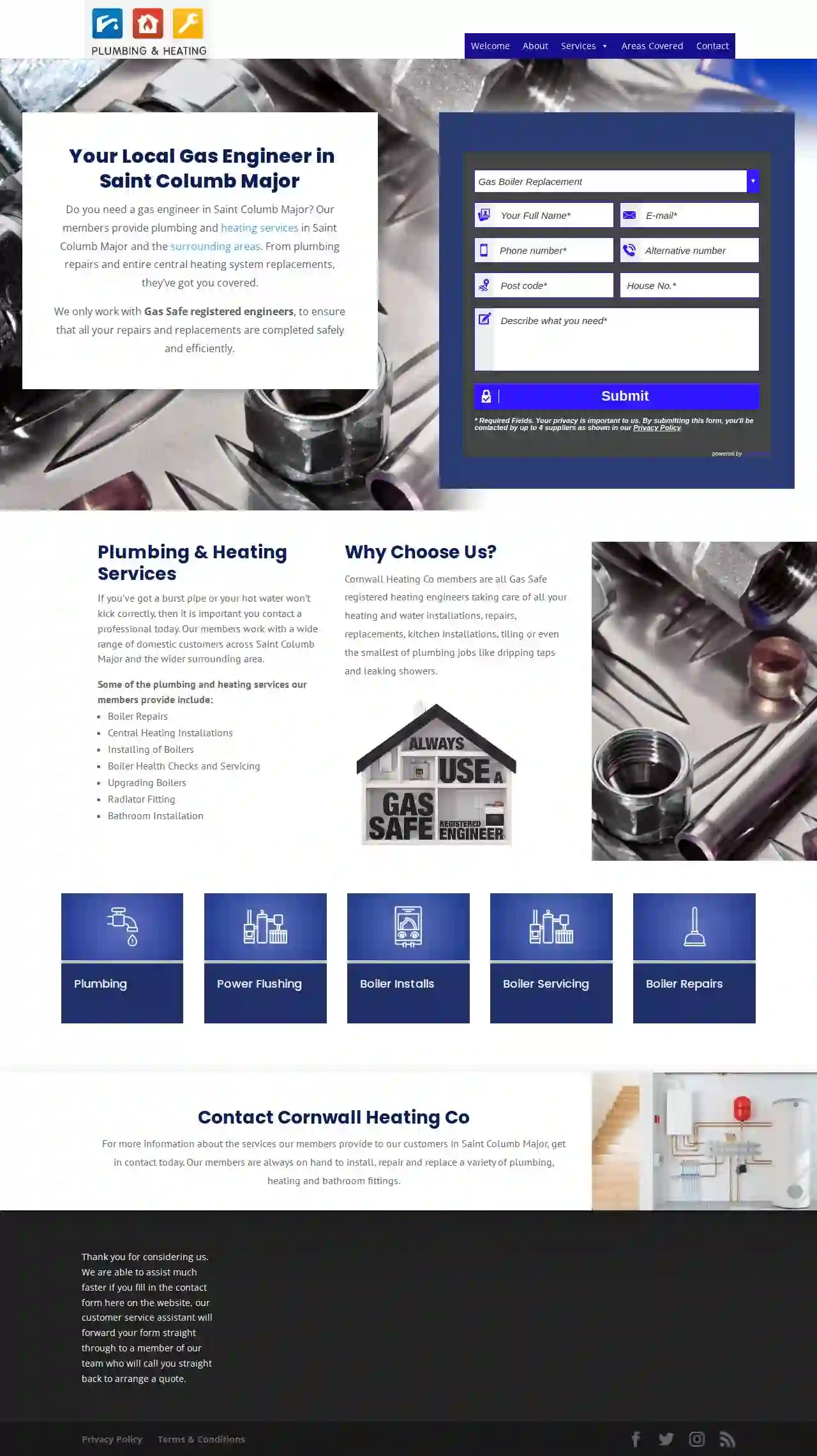
Gas Install Ltd - Gas Installation Services in Cornwall
51 reviewsTruro, GBCornwall Heating Co members are all Gas Safe registered heating engineers taking care of all your heating and water installations, repairs, replacements, kitchen installations, tiling or even the smallest of plumbing jobs like dripping taps and leaking showers. We only work with Gas Safe registered engineers, to ensure that all your repairs and replacements are completed safely and efficiently. If you’ve got a burst pipe or your hot water won’t kick correctly, then it is important you contact a professional today. Our members work with a wide range of domestic customers across Cornwall and the wider surrounding area. Some of the plumbing and heating services our members provide include: Boiler Repairs, Central Heating Installations, Installing of Boilers, Boiler Health Checks and Servicing, Upgrading Boilers, Radiator Fitting, Bathroom Installation.
- Services
- Why Us?
- Gallery
Get Quote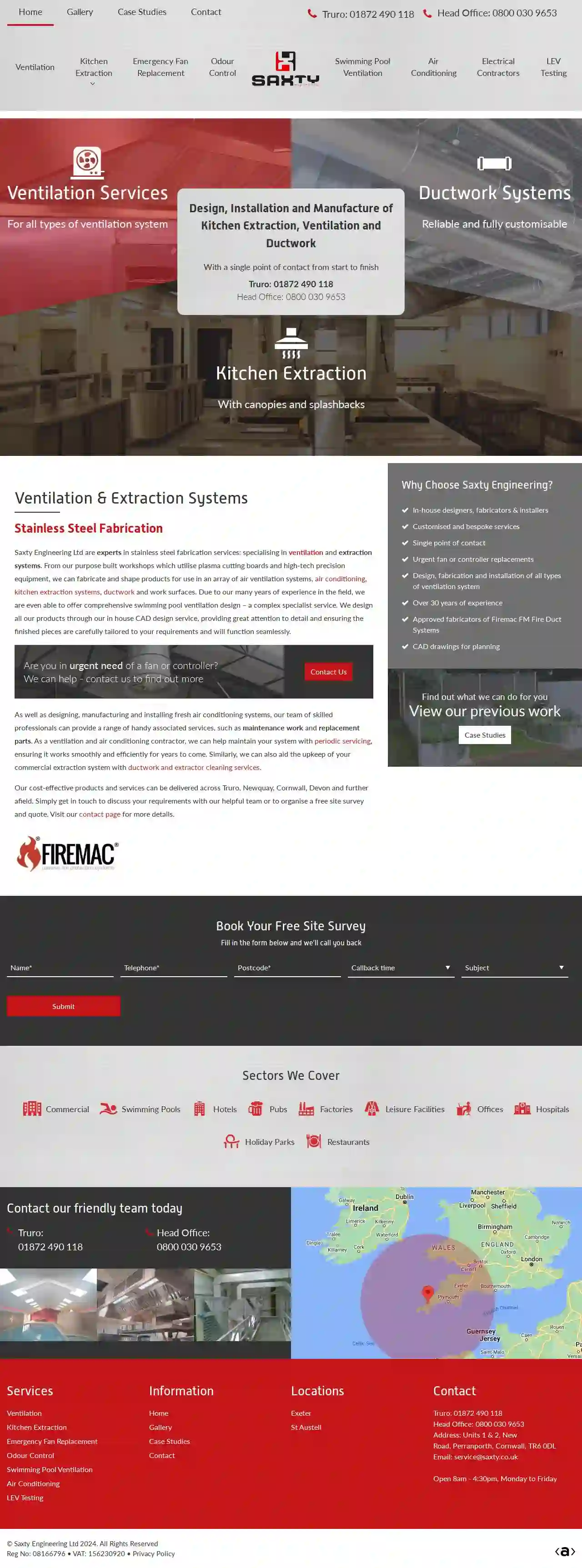
Saxty Engineering Ltd
Units 1 & 2, New Road, Perranporth, TR6 0DL, GBSaxty Engineering Ltd are experts in stainless steel fabrication services: specialising in ventilation and extraction systems. From our purpose built workshops which utilise plasma cutting boards and high-tech precision equipment, we can fabricate and shape products for use in an array of air ventilation systems, air conditioning, kitchen extraction systems, ductwork and work surfaces. Due to our many years of experience in the field, we are even able to offer comprehensive swimming pool ventilation design – a complex specialist service. We design all our products through our in house CAD design service, providing great attention to detail and ensuring the finished pieces are carefully tailored to your requirements and will function seamlessly. As well as designing, manufacturing and installing fresh air conditioning systems, our team of skilled professionals can provide a range of handy associated services, such as maintenance work and replacement parts. As a ventilation and air conditioning contractor, we can help maintain your system with periodic servicing, ensuring it works smoothly and efficiently for years to come. Similarly, we can also aid the upkeep of your commercial extraction system with ductwork and extractor cleaning services. Our cost-effective products and services can be delivered across Truro, Newquay, Cornwall, Devon and further afield. Simply get in touch to discuss your requirements with our helpful team or to organise a free site survey and quote.
- Services
- Why Us?
- Accreditations
- Gallery
Get Quote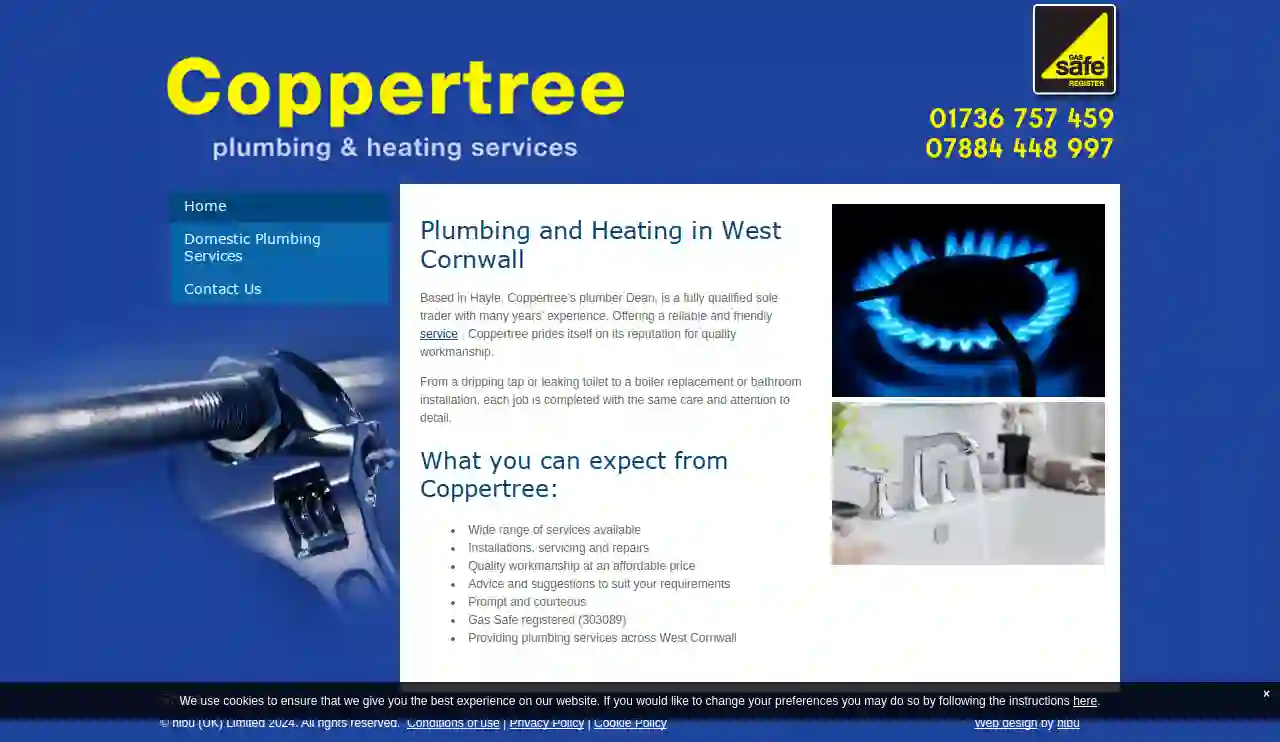
Coppertree Plumbing & Heating Services
52 reviews5 Trelawney Place, Hayle, TR27 4LF, GBCoppertree Plumbing & Heating is a fully qualified sole trader with many years' experience, based in Hayle, West Cornwall. We pride ourselves on our reputation for quality workmanship, offering a reliable and friendly service. From a dripping tap or leaking toilet to a boiler replacement or bathroom installation, each job is completed with the same care and attention to detail. We provide a wide range of services, including installations, servicing, and repairs, with quality workmanship at an affordable price. Our team is Gas Safe registered (303089) and provides plumbing services across West Cornwall.
- Services
- Why Us?
- Our Team
- Gallery
Get Quote
Kensa Contracting
3.37 reviewsMount Wellington, Chacewater, Truro, TR4 8RJ, GBKensa Contracting delivers pioneering and high-quality MCS accredited ground source heat pump projects at scale. With unrivalled experience and expertise, and a UK-wide network of expert consultants and contractors, Kensa Contracting offers a complete turnkey delivery service. The company provides access to grants, subsidies, and funding for ground source heat pumps and Shared Ground Loop Arrays, including zero-cost infrastructure. Kensa Contracting is an expert in grants & subsidies and funding for ground source heat pumps and Shared Ground Loop Arrays, including zero-cost infrastructure.
- Services
- Why Us?
- Accreditations
- Our Team
- Testimonials
- Gallery
Get Quote
Custom Heat Limited
516 reviewsRugby, Warwickshire, 9 Somers Road, CV22 7DB, GBYour local trusted independent, family-run heating & plumbing business since 1980. Fully accredited, for your peace of mind. Hassle-free plumbing, electric and heating services. Custom Heat have been serving the residents of Rugby since 1980, and now proudly offer our services to both domestic and commercial customers across the Midlands, East of England, South East and Cornwall.
- Services
- Why Us?
- Gallery
Get Quote
Superior Plumbing & Heating of Cornwall
4.856 reviews150 Britannia Road East, unit 18, Mississauga, L4Z 2A4, GBSuperior Plumbing & Heating is a local company with years of experience in providing top-notch plumbing and HVAC services in Cornwall, Ontario. Our team of fully licensed and qualified plumbers is dedicated to providing fast and reliable solutions for all your plumbing needs. We offer a wide range of services, including toilet repair, shower installation, sump pump installation, and more. Our prices are affordable, and we provide a warranty of up to 90 days for all our services. With over 400 positive reviews, you can trust us to get the job done right. Contact us today to schedule an appointment or request emergency service.
- Services
- Why Us?
- Gallery
Get Quote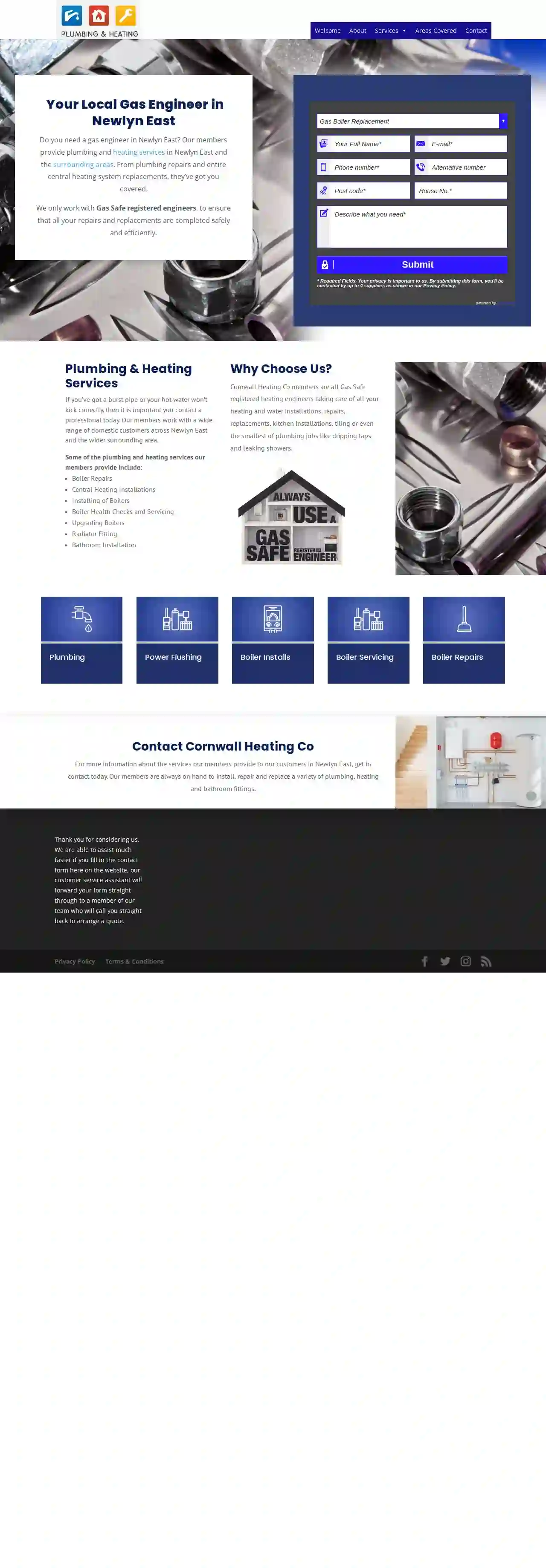
Chris Angove Heating Ltd
Penryn Business Park, Penryn, Unit 1, TR1, GBCornwall Heating Co is a network of Gas Safe registered heating engineers serving Cornwall and the surrounding areas. They offer a wide range of plumbing and heating services, from boiler installations and repairs to central heating system replacements and bathroom installations. Their team of experienced engineers ensures all work is completed safely and efficiently. Whether you need a small repair like fixing a dripping tap or a larger project like a full bathroom renovation, Cornwall Heating Co can help.
- Services
- Why Us?
- Gallery
Get Quote
Over 12,692+ HVAC Contractors on our platform
Our HVAC contractors operate in Helston and beyond!
HVACCompaniesHub has curated and vetted Top HVAC Companies near Helston. Find a top & reliable business today.
Frequently Asked Questions About Emergency HVAC Services
- Lower Your Thermostat: Set your thermostat to a lower temperature when you are away or asleep. Consider installing a smart thermostat for precise temperature control.
- Seal Air Leaks: Seal gaps and cracks around windows, doors, and other openings to prevent heat loss.
- Improve Insulation: Make sure your home is properly insulated.
- Annual Furnace Maintenance: Annual servicing ensures your system is functioning optimally.
- Use Window Coverings: Close curtains or blinds at night to retain heat.
How can I prevent future HVAC emergencies?
What is the best way to heat my home efficiently?
How often should I replace my AC unit?
What's the difference between a single-stage and two-stage furnace?
How can I prevent future HVAC emergencies?
What is the best way to heat my home efficiently?
- Lower Your Thermostat: Set your thermostat to a lower temperature when you are away or asleep. Consider installing a smart thermostat for precise temperature control.
- Seal Air Leaks: Seal gaps and cracks around windows, doors, and other openings to prevent heat loss.
- Improve Insulation: Make sure your home is properly insulated.
- Annual Furnace Maintenance: Keep your furnace running efficiently with annual inspections and tune-ups.
- Use Window Coverings: Close curtains or blinds at night to retain heat.